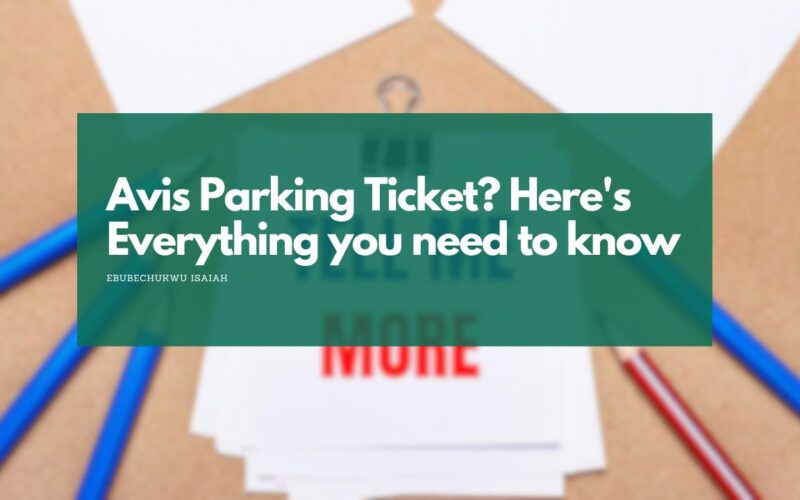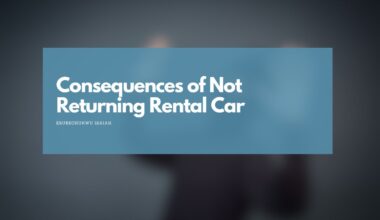As an Amazon Associate, I earn a small commission from qualifying purchases. Learn more about this.
You’ve plotted out your route, made all the right plans, and rented a car from Avis for your journey.
But regardless, a small oversight leads to a parking ticket. What now?
If you’re scratching your head, wondering about the implications and the way forward, you’re in the right place. Read on to find out everything about handling parking tickets with Avis
The Reality of Parking Tickets with Rental Cars
The concept of parking tickets isn’t new.
They’ve been around almost as long as cars themselves. But when you’re behind the wheel of your own car, the process is straightforward.
Get a ticket, pay it off, move on. Yet, the dynamics shift when it’s a rental car – especially from a well-established company like Avis.
Parking tickets are primarily issued as a means to regulate traffic and ensure that there’s an efficient flow of vehicles in busy areas.
Whether you’ve parked too long in a time-restricted spot or accidentally left your car in a permit-only zone, these tickets serve as a penalty for not adhering to the stipulated rules.
When you’re in a rental from Avis, or any other rental company for that matter, the ticket is generally issued to the vehicle, not the person driving it.
So, in the case of rental cars, the ticket goes to the registered owner of the vehicle: Avis. That might offer an immediate (if false) sense of relief. After all, it’s not your car, so it’s not your ticket, right? Wrong.
Although Avis will receive the ticket, they possess your information and have the ability to associate the violation with your rental agreement. This means that the ticket will eventually find its way back to you, albeit with a few added extras in terms of service fees.
How Avis Handles Parking Violations
When a ticket is issued to an Avis vehicle, the respective city or municipality typically sends the fine notice to the registered owner of the vehicle – in this case, Avis.
Since Avis maintains comprehensive records of all their rentals, they can quickly trace the ticket back to the specific renter who had the vehicle at the time of the violation.
Once they identify the responsible renter, Avis has a general policy to pay the fine on behalf of the renter to ensure it’s settled promptly and to prevent any escalation in charges or penalties. However, this isn’t just a courtesy service.
In paying the fine, Avis charges an administrative fee to cover their processing costs. This fee is usually mentioned in the fine print of your rental agreement. It’s worth noting that while this fee may seem convenient, it can sometimes be as much as, or even more than, the ticket itself.
Another aspect to be aware of is the timeline. There’s often a window between when the ticket is issued and when Avis receives and processes the notice.
If you’ve been proactive in addressing the violation directly with the city or municipality before Avis pays it, you might avoid the administrative fee. However, if Avis pays the ticket before you have the chance, you’ll be on the hook for both the ticket cost and the fee.
So, What Should You Do About an Avis Parking Ticket?
Realizing you’ve received a parking ticket while using a rental car can initially be a moment of panic.
However, understanding your options can make the process much smoother and potentially less costly.
- Pay It Yourself: The most straightforward course of action is to settle the ticket yourself. Many municipalities have made it convenient to pay parking tickets online or by phone. By handling it directly, you’re ensuring that the fine is settled swiftly. This is particularly crucial if you’re renting in a city that you’re visiting temporarily. Leaving without addressing the ticket could lead to complications later, especially if the fine escalates or if Avis steps in to handle it.
- Document Everything: Once you’ve paid the ticket, keep a copy of the payment receipt or confirmation. In today’s digital age, snapping a photo with your smartphone is quick and easy. This documentation becomes essential if there’s any dispute later on, or if Avis inadvertently tries to charge you for the ticket.
- Notify Avis: Communication is key. After paying the ticket, inform Avis about the violation and provide them with evidence of payment. This proactive approach ensures that they’re in the loop and reduces the chances of them accidentally paying the ticket on your behalf (and subsequently charging you an administrative fee).
Additionally, if you feel the ticket was issued in error or if there were extenuating circumstances, you might consider contesting it.
While this can be a longer process and there’s no guarantee of success, in some cases, it might be worth the effort. If you choose this route, again, inform Avis of your intentions so they can make a note in their system.
What If You Ignore the Ticket?
Ignoring a problem doesn’t make it disappear, especially when it comes to parking tickets. It might be tempting to dismiss it, thinking the rental company will sort it out, or perhaps assuming that a ticket in a city you’re merely visiting won’t come back to haunt you.
But here’s what actually happens if you decide to turn a blind eye:
- Fines Can Increase: Most municipalities have a system where fines grow over time. What might start as a minor penalty can balloon into a much larger amount if not addressed promptly. The longer the delay in payment, the more you risk seeing added charges due to late fees.
- Avis Will Eventually Pay: Rental companies, including Avis, have a reputation to maintain. They won’t let tickets linked to their vehicles go unpaid indefinitely. If you don’t settle the ticket, Avis will. But when they do, it will come with the added cost of their administrative fee, which you’ll be responsible for.
- Impact on Your Rental History: Repeated offenses or the habit of leaving tickets unpaid could affect your standing with rental companies. While it might not have immediate consequences, rental agencies may flag repeat offenders, which can affect your ability to rent in the future or lead to higher rental rates.
- Potential Credit Score Impact: If a ticket is ignored for an extended period, some municipalities might send the unpaid ticket to a collections agency. Once it reaches this stage, there’s a possibility it could negatively impact your credit score. While this isn’t the norm for all cities or tickets, it’s a risk you take when leaving tickets unpaid.
Conclusion
If you get a parking ticket with an Avis rental car, the key is communication. Inform Avis, pay the ticket directly if you can, and ensure you’re not hit with unnecessary charges. Mistakes happen, but how you handle them makes all the difference.







